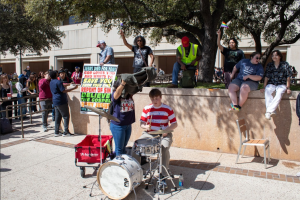Embracing the whole message
January 24, 2023
When people reminisce on the legacy of Dr. Martin Luther King Jr., several things come to mind: the bus boycotts, the march from Selma to Montgomery, Alabama, his “Letter from Birmingham Jail” and most notably, the March on Washington, where he delivered his acclaimed “I Have a Dream” speech. In the decades since King delivered this iconic address on the steps of the Lincoln Memorial, citizens and leaders across the country have embraced it as a message calling for peace — one that encourages those of different races to unite against racism and inequality. This very interpretation of King’s speech has caused people to view him as a pacifist — someone who believes violence is unjustifiable — and believe that his message was merely about nonviolence when in reality, it was immensely more radical than that.
Despite his modern-day portrayal as a pacifist, King’s ideals and beliefs were practically unheard of during his time, making him significantly more radical than the way history likes to remember him. A work of his that fully displays this progressivism, and is arguably a highlight of his career, is his “Letter from Birmingham Jail.” In the letter, King condemns white supremacy for the evil that it is and expresses why urgency is the only option to combat it, according to an article from Vox. King also condemns what he refers to as the “white moderate,” stating that their complacency in white supremacy and desire to maintain the status quo was a significant threat to civil liberties and Black advancement. At a time when Black people were expected to accept their inferiority in society, King’s willingness to call out his oppressors and their role in racial injustice was a blatant display of radicalism.
However, aside from his Liberal views regarding race relations in America during the 1960s, King also had profound ideas about topics like class and war. According to the previously mentioned Vox article, King was heavily involved in the Poor People’s Campaign in the years leading up to his assassination. The goal of this campaign was to achieve economic justice for impoverished Americans, which was a subject of great passion for King. This is made more evident by the fact that King’s last act before his death was a trip to Memphis to support the sanitation workers’ strike there. Given this, it is clear that King was a champion of economic equality and racial equality, which was also revolutionary for his era.
A final testament to King’s radicalism is the fact that he heavily opposed the war in Vietnam, which set him apart from several of his colleagues at the time. Throughout the Vietnam War, King repeatedly condemned America’s role in the conflict. In a speech titled “Beyond Vietnam,” King stated, “Now, it should be incandescently clear that no one who has any concern for the integrity and life of America today can ignore the present war. If America’s soul becomes totally poisoned, part of the autopsy must read: Vietnam. It can never be saved so long as it destroys the deepest hopes of men the world over.” King’s anti-war stance was yet another progressive belief he held that has been forgotten in his legacy.
King was assassinated in 1968, and it took 15 years until Martin Luther King Jr. Day became a federal holiday in 1983. His words have been invoked every year since the holiday was established to preach an idea of harmony and love for those who are different from us; however, in order to completely honor King, people need not only champion the watered-down parts of his messages that display him as a pacifist. In order to truly uphold King’s legacy, people must embrace all parts of his message — the anti-racist parts along with the anti-capitalist and anti-war aspects. Only by embracing the entirety of King’s message, of what he believed and fought for, will America’s annual celebration of his life and legacy feel genuine.










